What Is Good to Drink Every Day for Sustained Energy and Health?
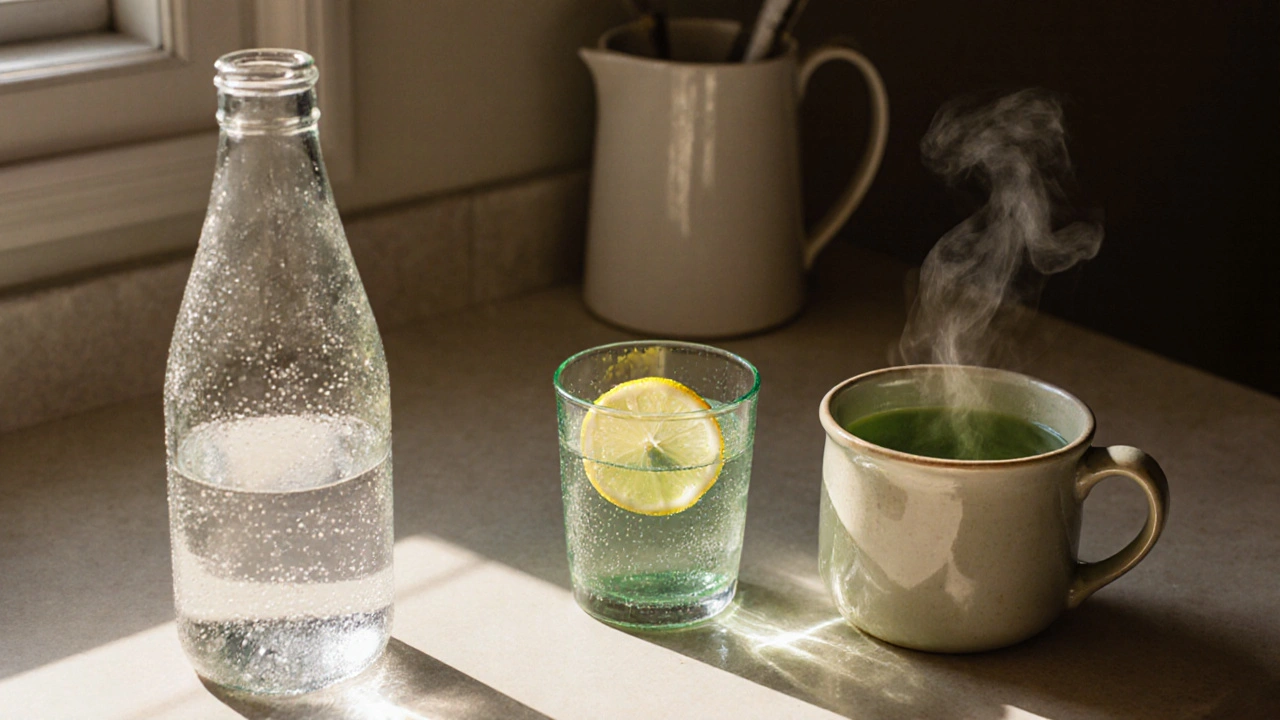
What you drink every day shapes your energy, focus, and long-term health more than you think. It’s not about chasing the next sugary buzz or relying on caffeine bombs that crash by noon. Real, lasting energy comes from what you sip consistently - not what you gulp when you’re already drained.
Water Is Still the Foundation
Start with the simplest thing: water. It’s not flashy, but it’s the only drink your body absolutely needs to function. If you’re even slightly dehydrated - and most people are - your brain works slower, your muscles tire faster, and your mood dips. Studies show that losing just 2% of your body’s water can reduce concentration and increase fatigue. That’s not a myth. It’s biology.
Most adults need about 2 to 3 liters a day, depending on activity, climate, and body size. In Brisbane’s humid heat, you’ll need more. Don’t wait until you’re thirsty. Keep a reusable bottle on your desk, in your car, by your bed. Sip slowly. Your body will thank you with steadier energy, fewer headaches, and better digestion.
Green Tea: The Quiet Energy Booster
If you’re looking for something with a gentle lift, green tea is the gold standard. It has about 25-40 mg of caffeine per cup - less than half a cup of coffee - but it also contains L-theanine, an amino acid that calms your nervous system while sharpening focus. This combo gives you alertness without the jitters or crash.
Matcha, a powdered form of green tea, packs even more antioxidants and nutrients. One study from the University of California found that regular green tea drinkers had lower rates of cognitive decline over 10 years. Drink it hot or iced, plain or with a splash of lemon. Skip the sugar. The flavor is subtle, but it grows on you - and so does the energy.
Electrolyte-Rich Drinks for Active Days
If you’re walking 10,000 steps a day, hitting the gym, or just sweating through a Brisbane summer afternoon, plain water isn’t always enough. You lose sodium, potassium, and magnesium through sweat. Replacing those matters.
Look for low-sugar electrolyte drinks with no artificial colors or preservatives. Brands like LMNT or Nuun offer clean options with under 1g of sugar per serving. Or make your own: mix 1 liter of water with 1/4 tsp salt, 1/4 tsp potassium chloride (salt substitute), and a squeeze of lime. It costs less than a dollar, and it works better than most store-bought sports drinks.
Drink these only when you’re active or in hot weather. No need to force them down if you’re sitting at a desk all day.
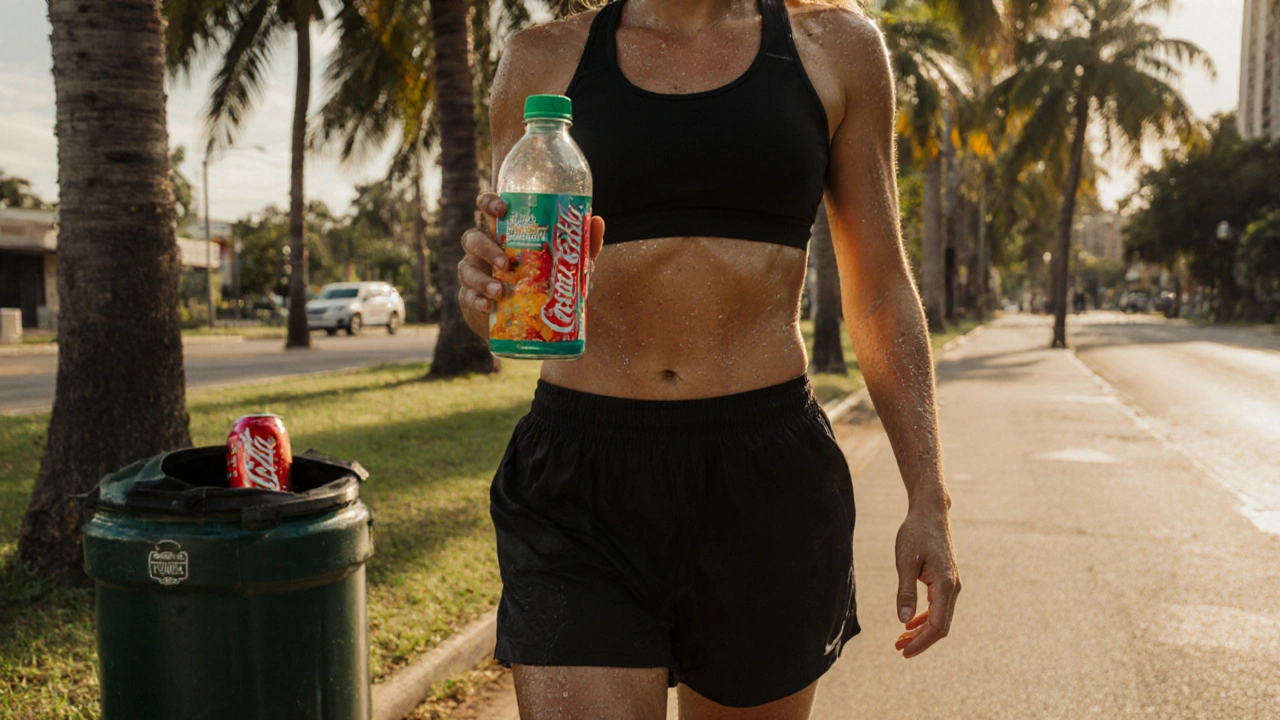
Coffee - But Not the Way You Think
Coffee isn’t evil. It’s one of the most studied beverages on the planet. Regular coffee drinkers have lower risks of type 2 diabetes, Parkinson’s, and liver disease. But the problem isn’t coffee - it’s how people drink it.
Black coffee, 1-2 cups a day, is fine. Add a splash of oat milk if you like. But if you’re drinking a 500ml latte with 4 pumps of syrup, you’re not getting energy - you’re getting sugar overload. That spike leads to a crash, then cravings, then more coffee to fight the fatigue. It’s a loop.
Try this: have your coffee before 2 p.m. and stick to one cup. Let your body reset. You’ll sleep better, and your energy will feel more natural.
What to Avoid - Even If It’s Marketed as “Healthy”
There’s a whole aisle of drinks labeled “natural energy,” “clean boost,” or “plant-powered.” Many are just sugar with fancy names.
Watch out for:
- Coconut water with added sugar - it’s marketed as a sports drink, but most brands have more sugar than soda.
- Energy shots with 200mg of caffeine and B-vitamins - they’re not supplements, they’re caffeine bombs with no nutrition.
- “Kombucha” that’s sweetened with fruit juice - true kombucha is lightly fermented and tart. The sugary versions are just fizzy soda with probiotics.
- Protein shakes with added caffeine - they’re not for daily hydration. They’re meal replacements.
If the ingredient list has more than 3 things you can’t pronounce, skip it. If sugar is in the top three ingredients, it’s not helping your energy - it’s stealing it.
Herbal Infusions for Calm Energy
Not all energy is about stimulation. Sometimes you need steady, calm energy - the kind that helps you focus without racing thoughts. Herbal teas deliver that.
Rooibos, from South Africa, is naturally caffeine-free and rich in antioxidants. It’s smooth, slightly sweet, and great iced or hot. Peppermint tea helps with digestion and mental clarity. Ginger tea reduces inflammation and warms you up on chilly mornings.
These aren’t energy drinks. They’re energy supporters. They help your body work better, not force it into overdrive.

The Daily Drink Routine That Works
Here’s what a simple, realistic daily drink plan looks like:
- First thing in the morning: 1 glass of water with lemon.
- Mid-morning: 1 cup of green tea or black coffee (no sugar).
- Afternoon: 1 glass of electrolyte water if you’ve been active or sweating.
- Evening: Herbal tea like rooibos or chamomile.
- Throughout the day: Water, water, water.
You don’t need fancy gadgets or expensive supplements. Just consistency. Drink water first. Add one or two supportive drinks. Skip the sugar traps. That’s it.
Why This Matters More Than You Realize
Most people think energy comes from caffeine or sugar. It doesn’t. Energy comes from stable blood sugar, good hydration, and clean fuel for your cells. What you drink every day either supports that - or sabotages it.
When you replace sugary drinks with water and herbal teas, you don’t just feel less sluggish. You sleep better. Your skin clears up. You crave less junk food. Your mood steadies. These aren’t side effects. They’re direct results of what you’re putting in your body.
You don’t need to be perfect. But if you make one change - say, swapping your afternoon soda for sparkling water with lime - you’ll notice the difference in a week. Try it. Track how you feel. You might be surprised.
What is the healthiest drink to have every day?
Water is the healthiest drink every day. It supports every bodily function, from brain performance to digestion. Add green tea or herbal infusions for extra benefits, but water should be your main source of hydration.
Can I drink energy drinks every day?
Most commercial energy drinks are not safe for daily use. They’re loaded with sugar, artificial stimulants, and unregulated caffeine levels. Even those labeled “natural” often contain hidden sugars and high doses of caffeine that can disrupt sleep and stress your heart. Stick to whole-food alternatives like green tea or electrolyte water.
Is coffee bad if I drink it daily?
No, coffee isn’t bad daily - if you drink it right. One to two cups of black coffee, without sugar or creamer, is linked to better long-term health. Avoid drinking it after 2 p.m. to protect your sleep. The problem isn’t coffee - it’s the sugar and oversized portions people add to it.
What should I drink instead of soda for energy?
Swap soda for sparkling water with lime, green tea, or a homemade electrolyte drink. These give you hydration and mild stimulation without the sugar crash. Green tea, in particular, offers L-theanine for calm focus - something soda can’t match.
Do I need sports drinks if I’m not an athlete?
Only if you’re sweating heavily for more than 60 minutes - like during intense workouts or hot outdoor work. For everyday activity, plain water and a pinch of salt in your food are enough. Most sports drinks are just sugary water with added electrolytes - not worth the sugar if you’re not sweating hard.
How much water should I drink daily?
Most adults need 2 to 3 liters per day. In hot or humid climates like Brisbane, aim for the higher end. A good rule: drink enough so your urine is pale yellow. Dark yellow means you’re behind. Clear means you’re overdoing it.
Next Steps: Start Small, Notice the Difference
You don’t need to overhaul your whole routine. Pick one thing: swap your afternoon soda for sparkling water with lime. Or replace your 3 p.m. energy bar with a cup of green tea. Do that for seven days. Write down how you feel - mentally, physically, emotionally.
That’s how real change happens. Not with grand gestures, but with small, consistent choices. Your body doesn’t need magic drinks. It just needs clean, simple fuel - every day.

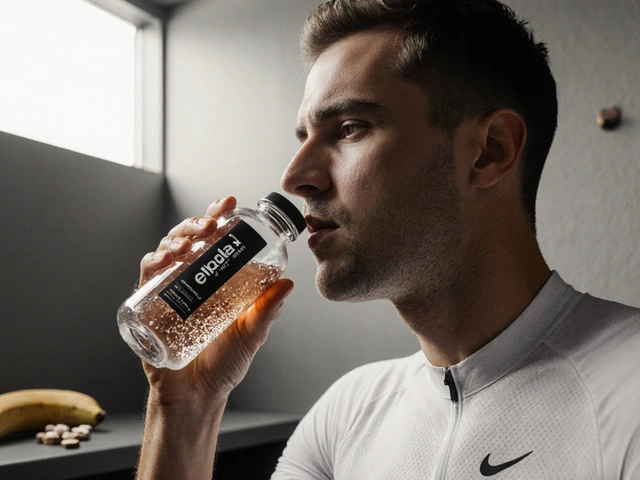
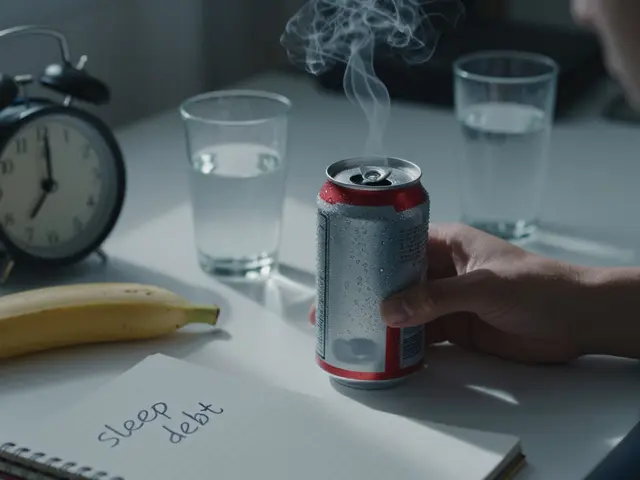
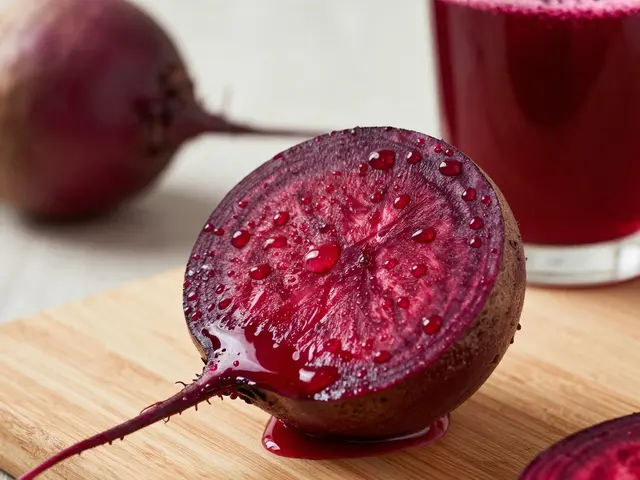
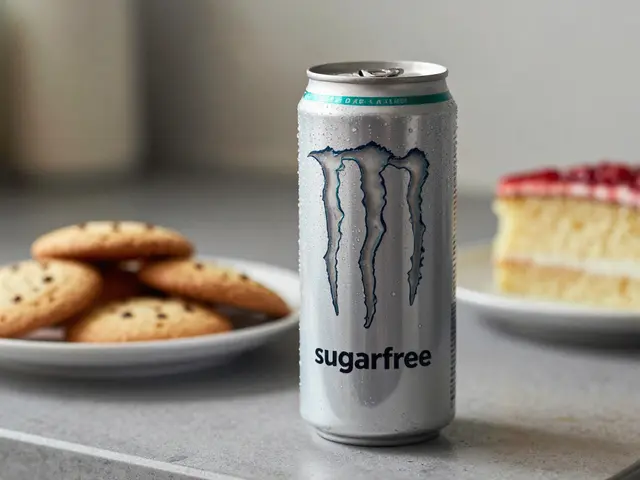
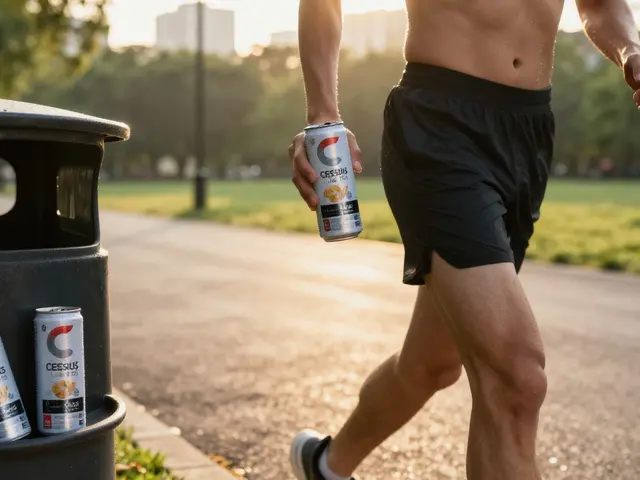
Comments (15)
Christina Morgan
23 Nov 2025
I swapped my afternoon soda for sparkling water with lime last week and honestly? My brain doesn’t feel like it’s been stuffed with cotton anymore. No crash. No 4 p.m. zombie mode. Just… calm. I didn’t think something so simple could make this big a difference.
Also, I started carrying a bottle everywhere. Even to the grocery store. People stare. I don’t care. My kidneys are thanking me.
Kathy Yip
23 Nov 2025
water is good but i wonder if theres a point where too much water is bad like i read somthing once about hyponatremia but im not sure if that was just a myth or what
also green tea is great but sometimes i just want something sweet and i feel guilty about it
Bridget Kutsche
25 Nov 2025
For anyone new to this - start with one change. Don’t try to overhaul everything at once. That’s how people quit.
I replaced my morning sugary coffee with black coffee + a glass of water. Within three days, my headaches vanished. By day seven, I was falling asleep easier. No magic. Just biology. You don’t need a detox. You just need to stop poisoning yourself with liquid sugar.
And yes - electrolytes matter if you sweat. I make my own with salt, potassium, and lime. Costs 12 cents a bottle. Works better than Gatorade. Try it.
Jack Gifford
27 Nov 2025
Green tea is underrated. I used to think it tasted like grass clippings. Then I tried matcha. Now I drink it every morning. No caffeine crash. Just steady focus. I even started brewing it cold brew style - less bitter, way smoother.
Also, if you think coffee is bad - you’re drinking it wrong. Black coffee is basically a health supplement. The problem isn’t the bean. It’s the syrup pumpers.
Sarah Meadows
29 Nov 2025
Let’s be real - if you’re drinking anything besides water, you’re already losing. Everything else is a distraction. Green tea? Still contains caffeine. Electrolytes? You’re not running a marathon. Herbal tea? Just flavored water. Stop overcomplicating it. Water. Period. The rest is marketing.
Nathan Pena
30 Nov 2025
The author’s argument is structurally sound but statistically underdeveloped. While anecdotal evidence is compelling, the references to ‘studies’ are vague and lack citation. For instance, the ‘University of California’ claim regarding cognitive decline is cited without a DOI, journal name, or sample size.
Furthermore, the assertion that ‘sugar is stealing energy’ is a reductive interpretation of glycemic load dynamics. The body doesn’t ‘steal’ energy - it metabolizes glucose, and insulin response varies by individual. This piece reads like wellness propaganda masquerading as science.
Also, ‘LMNT’? You’re endorsing a brand. That’s not advice. That’s an affiliate link.
Mike Marciniak
2 Dec 2025
Water is fine. But have you ever wondered who controls the water supply? The same corporations that own the bottled water brands, the soda companies, the electrolyte drink makers. They want you to think hydration is a product you buy.
Real water is free. Tap water. Rain. Streams. But they’ve convinced you it’s dirty. They’ve convinced you to pay for plastic bottles. They’ve convinced you that green tea is ‘healthy’ - but only if you buy their brand.
They’re selling you a myth. Water isn’t the answer. Awareness is.
VIRENDER KAUL
2 Dec 2025
It is not advisable to consume any beverage other than water on a daily basis unless one is engaged in strenuous physical activity under extreme climatic conditions. The human physiology has evolved over millennia to function optimally with minimal external supplementation. The addition of tea, electrolytes, or herbal infusions introduces unnecessary variables into a system that was designed for simplicity.
Furthermore, the promotion of matcha as a superior form of green tea is a Western commercial construct. Traditional East Asian tea culture values minimalism and moderation. One cup of plain, unadulterated green tea, consumed without expectation of enhancement, is sufficient.
One must question the motives behind the proliferation of ‘clean’ electrolyte products. Are they truly health-oriented, or are they profit-driven? The answer is obvious.
Krzysztof Lasocki
2 Dec 2025
Wow. Someone actually wrote a post that doesn’t sound like a LinkedIn influencer trying to sell a $200 ‘energy reset’ course.
And for once, no one’s saying ‘just drink lemon water and manifest your glow-up.’ This is real. Practical. No bs.
I’ve been doing the water + green tea thing for a month. My ADHD brain finally stopped feeling like a browser with 47 tabs open. Also - I stopped craving sugar. Not because I’m ‘strong.’ Because my body stopped screaming for a fix.
Thanks for writing this. I’m sharing it with my entire family.
Henry Kelley
4 Dec 2025
Just wanted to say I tried the homemade electrolyte thing after reading this. Salt, potassium, lime. Made a big pitcher. Tasted like… water with a tiny bit of tang. Didn’t think it’d work.
But after hiking for 2 hours in 90-degree heat? I didn’t cramp. Didn’t feel like I was gonna pass out. Just… fine.
Also, I didn’t buy anything. Just used stuff from my kitchen. Feels good to not be scammed by marketing.
Victoria Kingsbury
6 Dec 2025
Let’s talk about the ‘sugar in top three ingredients’ rule - that’s a solid heuristic, but it’s not foolproof. Some ‘natural’ sweeteners like agave or honey are still fructose bombs. And ‘kombucha’? Most store-bought versions are fermented sugar water with a probiotic afterthought.
Also, rooibos is great, but if you’re in a cold climate, drinking it iced in winter? You’re not supporting your circulation. Warmth matters. Heat the tea. Don’t ice it unless you’re sweating.
And for the love of god - stop calling coconut water ‘natural.’ It’s not. The sugar content is insane. It’s just a trendy version of Gatorade.
Tonya Trottman
7 Dec 2025
Water is the ‘healthiest’ drink? Really? That’s your big takeaway? You could’ve saved 2000 words and just said ‘drink water.’
And green tea? It’s got caffeine. So is coffee. So is yerba mate. So is black tea. You’re not ‘avoiding caffeine’ - you’re just swapping one stimulant for another with a fancier label.
And ‘no sugar’? What about stevia? Monk fruit? Are those ‘natural’ enough for you? Or are you just anti-sugar because it’s trendy?
Also, ‘LMNT’? You’re literally advertising. This isn’t advice. It’s a sponsored post with footnotes.
Rocky Wyatt
7 Dec 2025
I used to do all this. Water. Green tea. No sugar. Felt great for a while. Then my anxiety spiked. My heart raced. My sleep got worse.
I went to a doctor. Turns out - my body needed sugar. Not candy. Not soda. Just a little. My cortisol was crashing because I was denying my own biology.
So now I drink black coffee with a teaspoon of honey. And I feel… human again.
Don’t let ‘healthy’ become a cage. Your body isn’t a spreadsheet.
Santhosh Santhosh
8 Dec 2025
I have been following this routine for the past six months since I read this article in my local library, and I must say that the change in my daily energy levels has been profound. I live in a small village in India where the summers are extremely hot and humid, and I work outdoors for about seven hours a day. Before, I used to rely on packaged sugary drinks to get through the day, but I would always feel lethargic by mid-afternoon and experience frequent dizziness.
After switching to plain water in the morning, followed by a small cup of green tea without sugar at noon, and then a homemade electrolyte solution made with salt, potassium chloride, and lime juice in the late afternoon, I noticed that my fatigue decreased significantly. My headaches, which used to occur almost daily, disappeared within two weeks. My digestion improved, and I no longer feel bloated after meals.
Moreover, I have stopped craving sweets, and my sleep quality has improved. I now fall asleep faster and wake up feeling more refreshed. I do not use any commercial products. Everything I consume is made from basic household ingredients. I believe that the key is not complexity, but consistency.
I have shared this routine with several of my neighbors, and many of them have reported similar results. It is not about expensive supplements or trendy drinks. It is about returning to simplicity and listening to the body's natural signals. I am grateful for this post because it reminded me of what I already knew deep down - that the body does not need much to thrive, only clarity and care.
Christina Morgan
9 Dec 2025
That’s the thing - we treat hydration like a diet. You don’t need to be perfect. You just need to show up. I still have the occasional soda. But now it’s a treat, not a habit.
And yeah - my skin looks better. My mood doesn’t swing like a pendulum. I didn’t know water could do all that.
Thanks for saying it so simply. Sometimes the simplest things are the hardest to remember.